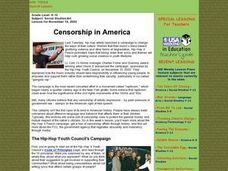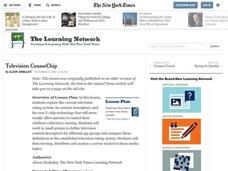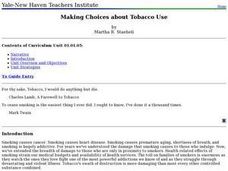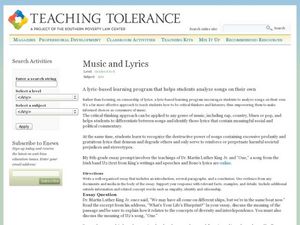Curated OER
Children's Media and Censorship
High schoolers form opinions about children and television censorship after analyzing literature. They complete a journal writing activity to identify the topic and make a list of inappropriate television shows for children. Next, they...
Media Smarts
Truth or Money
Two compelling texts about tobacco companies' influence over editorial content in print media introduce readers to the concept of advertising censorship. After study and discussion, class members compose a mock "final column" by a...
Curated OER
Debate: Press Censorship
Students consider the responsibility of the media to present newsworthy items while still protecting national security during times of war. They take sides acting as politicians and newsmen and debate the merits of censorship of the media.
Curated OER
War and the Media Press Freedom vs. Military Censorship
Students analyze the relationship between war and media. In this media awareness instructional activity, students listen to their instructor present a lecture on freedom of the press and military censorship. Students participate in an...
Curated OER
Censorship in the Classroom: Understanding Controversial Issues
Students examine propaganda and media bias and explore a variety of banned and challenged books. Following this, students choose a side of the censorship issue and support their position by developing an ad campaign about the banned book...
Curated OER
Censorship In Fahrenheit 451
Tenth graders explore the concept of censorship through a reading of Fahrenheit 451. They discuss the issue and its relation to contemporary society. Students work in groups to debate the pros and cons of censorship in our society.
Curated OER
Children's Media and Censorship
Students examine the point of censorship when dealing with Students. They explore essays by Stephen King.
Curated OER
The Role of the Media
Students analyze the role of media in the Gulf War after watching a video series. They participate in a small group simulating a specific group from the film. They discuss issues with their group and then participate in a whole class...
Curated OER
Ban That Book!
Take advantage of Banned Book Week to pique students' interest and get them reading! Create a classroom display of previously banned books and allow each member of your class to choose one to read. After they have read their book, get...
Curated OER
A Picture is Worth How Many (unfiltered) Words?
Students explore Google search engine in and out of China, examine events surrounding confrontation at Tiananmen Square between Chinese forces and the Tank Man, and discuss how censorship affects what the media reports and what the...
Curated OER
Censorship in America
Pupils follow resource links to study the history of art censorship in the US. They study the work of the FCC and the Hip-Hop 4 Peace campaign.
Social Media Toolbox
Cyberbullying
What can we do to make our school community more aware of cyberbullying? From The Social Media Toolbox, lesson 10 of 16 takes on the tough topic of bullying. Learners research cyberbullying through online research, then create an...
Curated OER
Read loud: The Media
In this media read aloud activity, learners read a dialogue aloud in pairs. Student A will ask a question about the media, and Student B gives the answer.
Curated OER
Television CensorChip
Explore the current television rating system, its content descriptors, and the new V-chip technology that more readily allow parents to control their child's television viewing. Help learners develop a survey that will determine the pros...
Curated OER
The Impact of Hazelwood on School Publications
Ninth graders explore the Supreme Court Case Hazelwood School District v. Kuhlmeier. In this American Government lesson, 9th graders research the recent history of censorship and how the courts have been involved in either protecting or...
Curated OER
Press Freedom Versus Military Censorship
Eleventh graders explore the term terrorism. For this US History lesson, 11th graders participate in a press release on terrorism.
Curated OER
Marie Antoinette and the French Revolution
Students examine how the French and American revolutions influenced and emergence of free press in these countries. Students explore the link between government control of the press and the type of government. They compare and contrast...
Curated OER
The Tank Man
Learners explore the events surrounding the confrontation at Tiananmen Square between Chinese forces and "The Tank Man." They discover how censorship affects what the media reports and what the public learns. Students research China's...
Curated OER
Making Choices about Tobacco Use
Students examine the dangers associated with smoking. In groups, they discuss what it means to be addicted to a drug and how the media influences our decisions. After watching excerpts of films, they identify the use of smoking and the...
Curated OER
Heavy: The Story of Metal (Part 2)
Young scholars discuss censorship of music and other art forms. Students create their own list of criteria for acceptable music. Young scholars write a list of their own "Filthy fifteen" based on their criteria for acceptable music.
Curated OER
Affirmative Action
Students explore policies concerning affirmative action. After reading affirmative action handouts, students use the internet and other resources to research information about affirmative action laws, court cases, and arguments. They...
Curated OER
Music and Lyrics
Eighth graders analyze lyrics from songs from a variety of genres. In this musical analysis lesson, 8th graders write an essay about their life plans in which they discuss the lyrics of U2's song, "One." They tell how the writings of Dr....
Curated OER
Images in Action
Learners explore the concept of tolerance as variety of images and words are probed for expressions of misinformation and stereotyping. Advertisements, textbooks, public monuments, historical markers, TV shows, Web sites, logos and...
Curated OER
Government Lesson Plan: Lesson Plan 3
Students examine affirmative action policies. They analyze the positive/negative aspects of affirmative action. They study historical development and current status of principles, institutions, and processes of political systems.

























